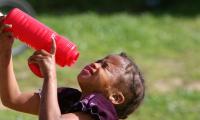The AAAQ toolbox

Purpose
The AAAQ toolbox aims to support the operationalisation of the rights to water, sanitation, food, housing, health, and education.
Designed with a multi-stakeholder approach in mind, the AAAQ Toolbox offers common methodologies for all stakeholders as well as tailored tools for states, rights-holders, business, civil society and National Human Rights Institutions (NHRIs).
The toolbox is open source, meaning that anyone can use it.
AAAQ stands for Availability, Accessibility, Acceptability and Quality and is a new, ground-breaking and hands-on approach to the so-called economic, social and cultural rights - such as the right to health, education, food and housing. Initially, the institute has worked to concretise the right to water.
The difference we make
The toolbox ensures that the minimum requirements are recognized by the state, by private water suppliers and by civil society. In Zambia, it means that civil society organisations use the AAAQ system as a tool for quality control and as a measure to make sure that public funds for water allocation are properly used to ensure the human right to water.
The AAAQ toolbox has also been used in Zimbabwe and Russia and is on track for new projects in Europe, Africa, Central Asia and South America and for other rights. We are currently working provisionally to develop AAAQ toolboxes to five additional rights: food, education, sanitation, housing and health.
Futhermore, in 2015, we joined a collaborative initiative to build a global network of NHRIs working with the right to water, based on the AAAQ toolbox.
